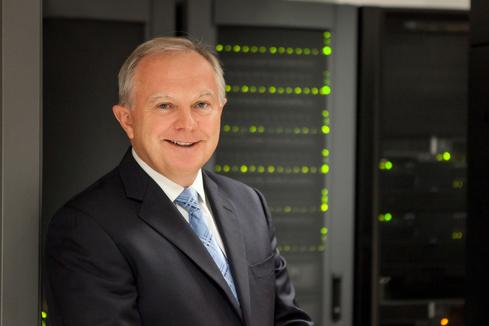As an IT and electronics distributor, Avnet is in a unique position to view the trends driving the technology industry. It's also in the position of implementing those trends itself, including cloud computing and customer self-service. Here's how CIO Steve Phillips aligns IT with business at Avnet.


Top Priorities For State CIOs: 2016
Top Priorities For State CIOs: 2016 (Click image for larger view and slideshow.)
The giant tech distribution companies that serve as conduits between technology buyers and sellers are uniquely suited to observe trends in the IT space. Distributor Avnet's vantage point offers a particularly broad view, because it serves not only the IT market -- its Technology Solutions market -- which is in the midst of a big transformation to digital business, but also the Electronics Marketing business, serving the component market, which has gained more visibility with the rise of the Internet of Things (IoT).
And Avnet is not simply witnessing the transformation of the tech market, it's experiencing it, too.
Avnet CIO Steve Phillips, who also serves as a member of the InformationWeek Editorial Advisory Board, is driving that transformation within the distribution company by aligning his IT organization with the goals of the overall business. It's not a job he started yesterday, either. He's been in the role for 10 years at this $27.9 billion company, which has 19,000 employees in 90 countries.
"Over the last 10 years we’ve made IT very accountable and a part of our business," Phillips told InformationWeek in an interview. "It feels quite good right now. But it’s a constant discussion and constant alignment."
Although Phillips is an electrical engineer by training, his passion is in business and leadership.
"In a world of IT, people can get too wrapped up in hardware and software," he told InformationWeek. That's why he advises the interns and management trainees who he meets every year, "Never lose sight of the fact that people keep it together. If you keep the focus on people, you won't go wrong in your careers."
[Looking for more CIO profiles? Read Intuit CIO Changing the Way Projects Are Managed.]
So, what does he consider the two big challenges for IT today? First, IT is crucial to the business and it must provide systems that are always on, always available, and always responsive.
Second, the rate of business change and innovation is faster than ever. "We must make sure that our ability to innovate and create new systems matches the rate of change in business today."
Within that environment, IT needs to be prepared for big technology trends and challenges for 2016. Phillips is seeing a few notable trends among Avnet's enterprise customers. These include:
Software-defined data centers
Software-defined networking
Mobility and mobile-first capabilities for enterprise users
The Internet of Things (IoT)
The predictive and automated promise of machine-learning projects
The Internet of Things
IoT is a particularly strong area for Avnet because of the company's position in the electronic components market, as well as in the IT market. The company has a 360-degree view of the whole IoT space. What does Phillips think will happen in this space in 2016?
"The Internet of Things, perhaps specifically the industrial Internet of Things, is going to get quite some momentum," he said. "It's been building over the last few years."
Within Avnet, IoT has its own momentum. "We have this term we use internally. We call it 'Edge to Enterprise,'" Phillips said. "We think of that as the entire chain of the Internet of Things, that starts at the edge with a sensor detecting behavior and ultimately becomes data that ends up in an enterprise and in some kind of system where it's analyzed."
Cloud Moves
Avnet is keeping a close eye on the cloud, and like many of its CIO customers it has moved most of its workloads to one type of cloud or another.
"As a CIO when I think about the public cloud, I'm not thinking about it as a way of saving money. I think about it as something that is easily scalable. I can deliver initial results faster because I can stand it up quickly," he said. "Then there's the shift from capex to opex."
Avnet itself currently operates about 80% of its workloads in its own private cloud and 10% in the public cloud, with the other 10% on other types of systems. That's a change from five years ago.
Back then, "we'd have had zero in the public cloud and more of a 60% in the private cloud and 40% in other platforms," Phillips said. He believes many other CIOs out there among Avnet's customers are operating in the cloud at similar levels and moving to the cloud at similar rates.
Today's organizations are assessing deployment differently.
"When we have new systems to establish, or we come close to a major upgrade, we look at what our choices are and try to make an effort to put a cloud option on the table," he said. "And then we make a financial assessment of what the best option is for us."
That said, the discussion has shifted. "We have found that the speed with which we can initiate an environment in the public cloud is attractive," Phillips said. "Over the long run, though it doesn't always make sense."
Sometimes, initial pilots will run in a public cloud environment and, once they gather momentum, the company reevaluates the deployment options. "Then, perhaps, it makes sense to bring it back on-premises," he said.
These internal experiences have certainly shaped Avnet's commercial offerings as well. While the distribution company does not host cloud services itself, in November 2015 Avnet introduced the Avnet Cloud Marketplace, designed to serve CIOs who are taking a cloud-first strategy when investing in new technology.
"CIOs are thinking more and more of cloud-based services as part of the landscape," Phillips said. "As we go to market with our systems, we needed to make an investment to allow VARs to sell cloud solutions to provide one-stop shopping for cloud services." The Marketplace features multiple vendors, including Amazon and IBM, and allows for aggregated invoicing so that customers get a single bill.
Digitizing the Business With Customer Self-Service
Avnet has also been working to create self-service options for its customers. For instance, Avnet is offering a service called uRenew for its value-added resellers (VARs). Avnet's VARs resell technology products and services to end-customer companies. uRenew provides VARs with a service to let them know when maintenance contracts across all vendors are coming up for renewal, helping VARs to do a better job of recognizing revenue from contract renewals.
"That's a good margin business for the VARs, and there's value there for the end-customer as well," Phillips said. Previously VARs would have to manually comb through various records to locate contracts coming up for renewal.
These ongoing projects are part of Avnet's efforts to digitize its own business -- to create systems that are easy for users and customers to access. That falls in line with Phillips' guiding principle of making IT accountable and central to overall company goals. Ensuring that continues to happen is an ongoing process, Phillips said. What best practices can other CIOs implement to align IT with business?
"First, go out into the business that you are responsible for and live a day in the shoes of the sales people or the warehouse people or the support people," he said. "Sit alongside them and see how their day goes and what matters to them."
Second: "When you engage with business colleagues, really engage with them," Phillips said. "We are all working together. We are on the same team."
(Avnet earned the No. 4 spot in the 2015 InformationWeek Elite 100 for its training initiatives. Is your company a contender for the 2016 awards? If so, click the link below -- the deadline to enter is fast approaching.)
[Editor's note: This article has been updated to represent Avnet's valuation more accurately.]
**Elite 100 2016: DEADLINE EXTENDED TO JAN. 15, 2016** There's still time to be a part of the prestigious InformationWeek Elite 100! Submit your company's application by Jan. 15, 2016. You'll find instructions and a submission form here: InformationWeek's Elite 100 2016.
About the Author(s)
You May Also Like







